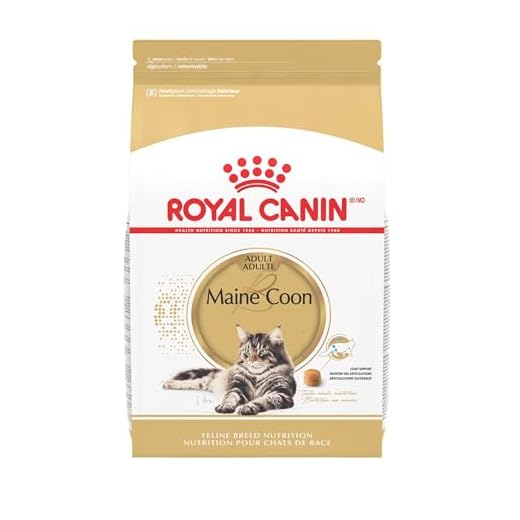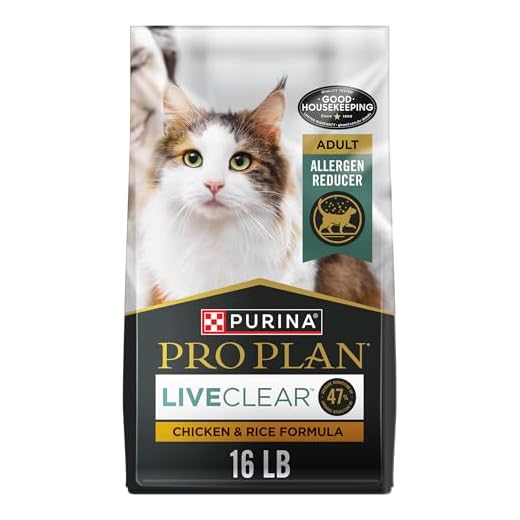



High-quality protein is a must for my buddies. A diet rich in meat sources, such as chicken, turkey, and fish, supports their robust muscles and overall health. It’s not just about filling their bowls; it’s about nourishing their bodies.
Incorporating wet food into their meals is beneficial. The moisture in canned options helps keep them hydrated, which is crucial for kidney function. I recommend offering a mix of dry and wet varieties to ensure they receive both hydration and dental benefits.
Don’t forget about the importance of healthy fats. Ingredients like salmon oil or fish oil can promote a shiny coat and healthy skin. Plus, adding a touch of taurine, an essential amino acid found in animal-based proteins, supports their heart and eye health.
Always avoid foods that are toxic to them, such as onions, garlic, and chocolate. Sticking to cat-specific treats and avoiding human snacks will keep them safe and thriving. Regular vet check-ups can help tailor their diet to meet specific needs as they grow.
Feeding Practices for My Feline Friends
High-quality protein sources should be prioritized. Chicken, turkey, and fish are excellent choices, providing the necessary amino acids for strong muscles and overall health.
Incorporate wet food into the diet. This not only enhances hydration but also adds variety and flavors that keep meals interesting.
Fruits and vegetables can be beneficial. Offer small amounts of pumpkin, carrots, or blueberries as occasional treats. These can aid digestion and provide essential vitamins.
Monitor portion sizes carefully. Overfeeding can lead to obesity, which poses health risks. I recommend following the feeding guidelines on food packaging and adjusting based on activity levels.
Maintain fresh water availability at all times. Hydration is key, especially if dry kibble is a significant part of their meals.
Consider the age and health status. Kittens need different nutrients compared to older companions. A balanced diet tailored to their life stage is crucial.
Always consult with a veterinarian before introducing new foods or making significant changes. They can provide personalized recommendations based on individual health needs.
- Protein: Chicken, turkey, fish
- Wet food: Enhances hydration and flavor
- Treats: Small portions of fruits and vegetables
- Portion control: Prevent obesity
- Water: Fresh and available
- Life stage: Tailored nutrition
- Vet advice: Always consult
Understanding Nutritional Needs of Maine Coons
High-quality protein should make up a significant portion of their diet. Look for meat-based ingredients like chicken, turkey, or fish as primary sources. These proteins support muscle development and overall health.
Fats are also important, providing energy and supporting skin and coat health. Omega-3 and Omega-6 fatty acids from fish oil or flaxseed oil can enhance their fur’s shine and reduce shedding.
Carbohydrates, while not the main focus, can be included in moderation. Opt for whole grains like brown rice or oats, which offer energy and fiber for digestive health. Avoid fillers like corn or wheat, as they provide little nutritional value.
Vitamins and minerals are crucial. Ensure their food contains essential nutrients like taurine, which supports heart and eye health, as well as vitamins A, E, and various B vitamins for overall well-being.
Hydration is often overlooked. Fresh water should always be available. Wet food can also help maintain hydration levels, especially for those who may not drink enough water.
Regular monitoring of weight is essential. Adjust portions according to their activity level and age. Overfeeding can lead to obesity, which is a common issue in larger breeds.
Consulting with a vet for specific dietary needs based on age, health, and lifestyle is always a wise choice. Tailoring their nutrition ensures they thrive and live a happy, healthy life.
Best Commercial Cat Foods for Maine Coons
For my fellow furry friends, I’ve compiled a list of the finest commercial food options tailored for larger breeds. These selections provide balanced nutrition and cater specifically to our unique dietary needs.
| Brand | Type | Main Ingredients | Protein Content |
|---|---|---|---|
| Royal Canin Maine Coon | Dry | Chicken, corn, rice | 34% |
| Hill’s Science Diet | Dry | Chicken, barley, brown rice | 30% |
| Blue Buffalo Wilderness | Dry | Deboned chicken, turkey meal, fish meal | 34% |
| Wellness CORE | Dry | Turkey, chicken, salmon meal | 38% |
| Purina Pro Plan | Wet | Chicken, liver, rice | 30% |
These options not only support healthy growth but also maintain a sleek coat and strong muscles. Regularly check the ingredient list and ensure a high protein source is at the top. Hydration is vital too, so consider mixing dry food with wet varieties for added moisture.
Consult with a veterinarian to tailor a diet plan specific to individual health needs and preferences. Your companion deserves the best!
Homemade Diet Options for Maine Coons
When crafting meals for these magnificent felines, focus on protein-rich ingredients. Cooked chicken, turkey, and lean beef serve as excellent bases. Ensure that meats are boneless and free of seasoning. Fish, such as salmon or tuna, can be offered occasionally to add variety but should not dominate their meals.
Incorporate organ meats like liver or heart, which provide essential nutrients. These should be included in moderation to avoid vitamin A toxicity. Aim for a balanced ratio of meat to organ meat, roughly three parts muscle meat to one part organ.
Add cooked vegetables like carrots or peas for fiber and vitamins. These should be pureed or finely chopped to aid digestion. Avoid starchy vegetables such as potatoes or corn, which offer little nutritional value.
Don’t forget about hydration. Fresh water should always be available, and consider adding a little low-sodium broth to meals to entice hydration. Homemade cat food can be supplemented with taurine, an amino acid vital for heart and eye health, especially if the diet lacks certain animal-based proteins.
Each feline is unique; consult with a veterinarian to tailor the diet to individual needs and monitor health. Keeping track of any dietary changes or reactions is crucial for adjusting recipes accordingly.
Common Dietary Restrictions and Allergies
Many felines face specific dietary challenges that owners must recognize. Common allergens include chicken, beef, dairy, and fish. Symptoms of food sensitivities often manifest as gastrointestinal issues or skin irritations. If your furry friend displays signs of discomfort after meals, consider consulting a veterinarian for allergy testing.
Some individuals may require a strict low-carb diet, particularly those diagnosed with diabetes. It’s essential to choose appropriate products, such as dry cat food for diabetic cats, to maintain their health and well-being. High-quality protein sources should be prioritized, and fillers like corn or soy should be avoided.
Additionally, age and pre-existing health conditions can influence dietary needs. Senior felines may benefit from specialized formulas formulated to support joint health and digestion. Always ensure fresh water is available, and monitor any changes in appetite or behavior closely.
Feeding Schedule and Portion Control for Maine Coons
For optimal health, a structured feeding routine is crucial. I recommend feeding twice a day, ideally in the morning and evening. Each serving should consist of high-quality food, tailored to their size and activity levels.
An adult feline of this breed typically requires around 20 calories per pound of body weight daily. For instance, if your furry friend weighs 15 pounds, aim for approximately 300 calories spread over two meals. Adjust portion sizes according to their energy levels, weight gain, or loss.
Monitor their body condition closely. If you notice excess weight, reduce the portions slightly. Conversely, if they seem too thin, consider increasing their intake. Regular weigh-ins will help track their health over time.
Hydration is also essential. Always provide fresh water alongside their meals. Wet food can be beneficial for hydration, but ensure they also have access to dry kibble for dental health.
For those who enjoy outdoor activities, balancing their diet with their exercise routines can be vital. If you’re looking for energetic companions, check out the best active dogs for apartments. Just like them, keeping your feline fit and healthy through proper feeding is key.









